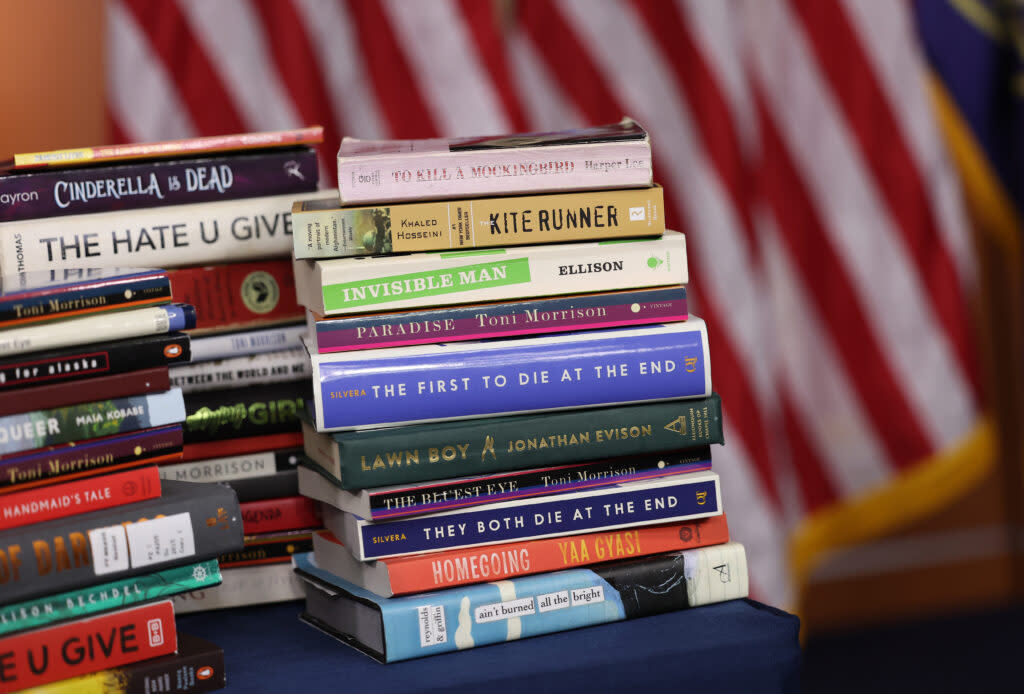Alabama’s anti-DEI bill would undermine higher education

- Oops!Something went wrong.Please try again later.
- Oops!Something went wrong.Please try again later.
Copies of banned books from various states and school systems from around the county are seen during a press conference by U.S. House Democratic Leader Hakeem Jeffries, D-New York, at the U.S. Capitol on March 24, 2023 in Washington, DC. (Kevin Dietsch/Getty Images)
“Ignorance is more costly to any state than education.” So said Booker T. Washington, founding president of Alabama’s Tuskegee University, one of the most distinguished historically Black colleges and universities (HBCUs) in the country. While a private, land-grant institution today, Tuskegee was chartered in 1881 by the Alabama Legislature.
As a former president of Tuskegee, I had the honor of serving as Washington’s successor, and of carrying forward his commitment to access to higher education for students of all backgrounds. Today, however, I am gravely concerned that the Legislature may be abandoning that historic commitment.
SB 129, a bill that would undermine the advancement and diffusion of knowledge in both public higher education and K-12 schools, has been passed by the House and Senate and is headed to the governor’s desk. SB 129 is one of over 350 educational gag orders that have been proposed in states around the country. These bills – over 20 of which have become law – censor educational speech on a broad swath of so-called “divisive concepts” related to race, gender, identity, and US history, depriving students of critical knowledge and understanding of the world in which they live. The most extreme educational gag order, Florida’s “Stop WOKE Act,” has been partially stayed by a federal court on the grounds that it violates professors’ free speech rights and unconstitutionally discriminates against students and faculty of color.
GET THE MORNING HEADLINES DELIVERED TO YOUR INBOX
In several ways, SB 129 would be a more serious threat to campus free expression than even the Stop WOKE Act. Like the Florida bill, it would prevent faculty not only from “advocat[ing] or requir[ing] assent to a divisive concept,” – a less restrictive, though still censorial, option enacted by several other states – but even from requiring students to “participate” in “course work” or complete course readings that promote such ideas. This language would restrict discussions of American history and culture in a variety of disciplines by prohibiting professors from assigning different ideas about the challenging issues of race, gender, and identity. Even worse – and unique to SB 129 – is a provision that would prevent faculty from assigning books or films where the author merely expresses that they themselves feel complicit in past wrongs.
Additionally, the bill would restrict students’ freedom. SB 129 prohibits state universities from “sponsor[ing] any diversity, equity, and inclusion program,” defined as any program where participation is determined “based on identity group.” In effect, this could well ban recognition or funding for Black student unions at public universities, including at Alabama’s eight public HBCUs.
Alabama should not be considering passage of one of the most repressive educational gag orders in the country. College should be a time to explore and debate ideas. Professors must be free to teach controversial issues from a variety of perspectives, and students must be free to engage with complex topics and diverse opinions from across the ideological spectrum and come to their own conclusions. Learning to evaluate evidence and weigh competing perspectives is core to the mission of higher education.
Most importantly, educational freedom is crucial for the protection of our liberties as American citizens. My father, a veteran of the United States Army, swore to defend those liberties. When the government starts telling professors and students what ideas they can and cannot discuss in the classroom, and students what groups they can and cannot associate with, that is the opposite of freedom.
By restricting the flow of knowledge in Alabama’s institutions of higher learning, bills like SB 129 threaten to take away the very ideals my father defended – and to replace prudent education with costly ignorance, undoing the work of past generations to educate the citizens of Alabama.
The post Alabama’s anti-DEI bill would undermine higher education appeared first on Alabama Reflector.

